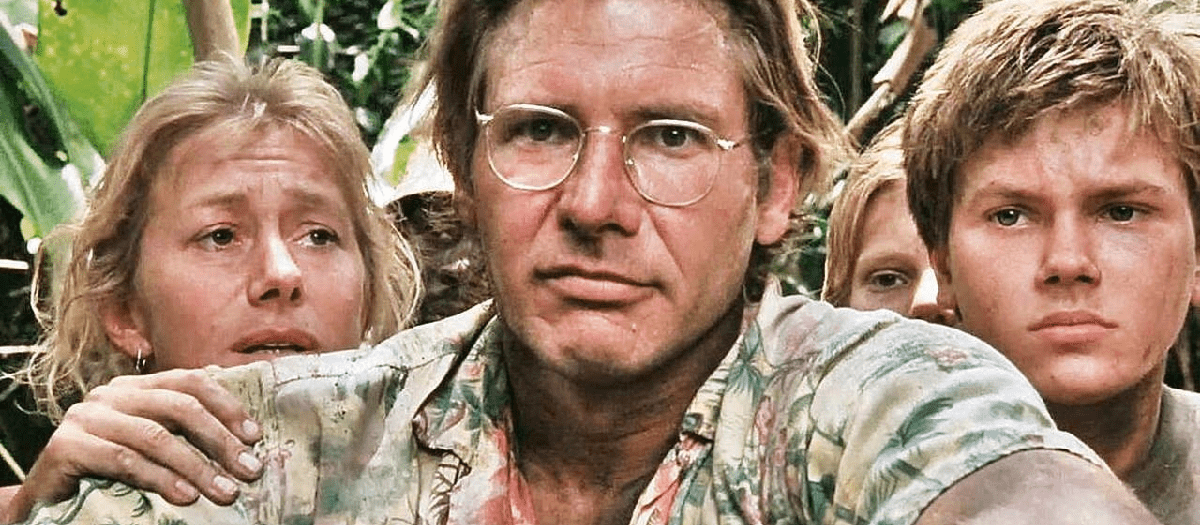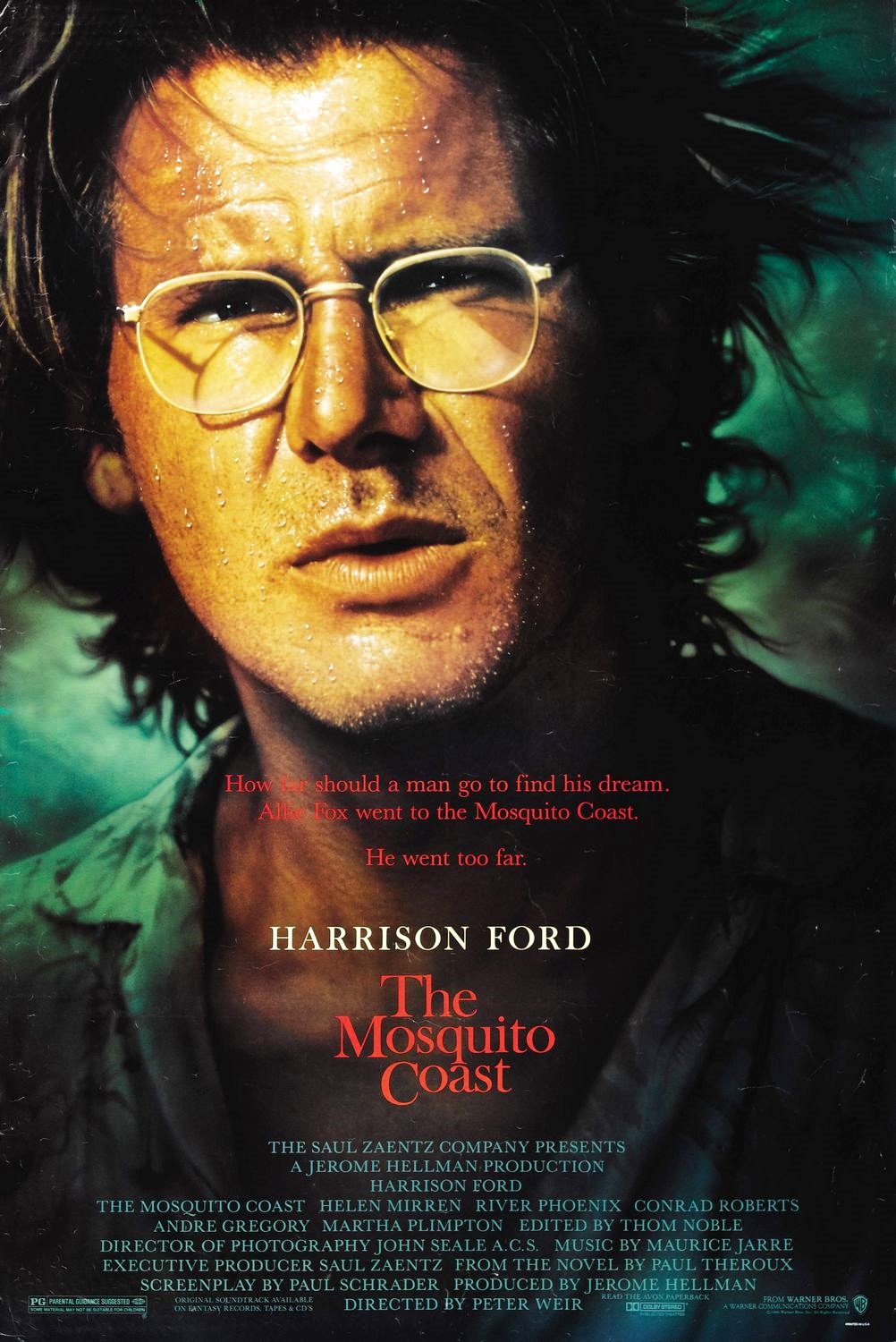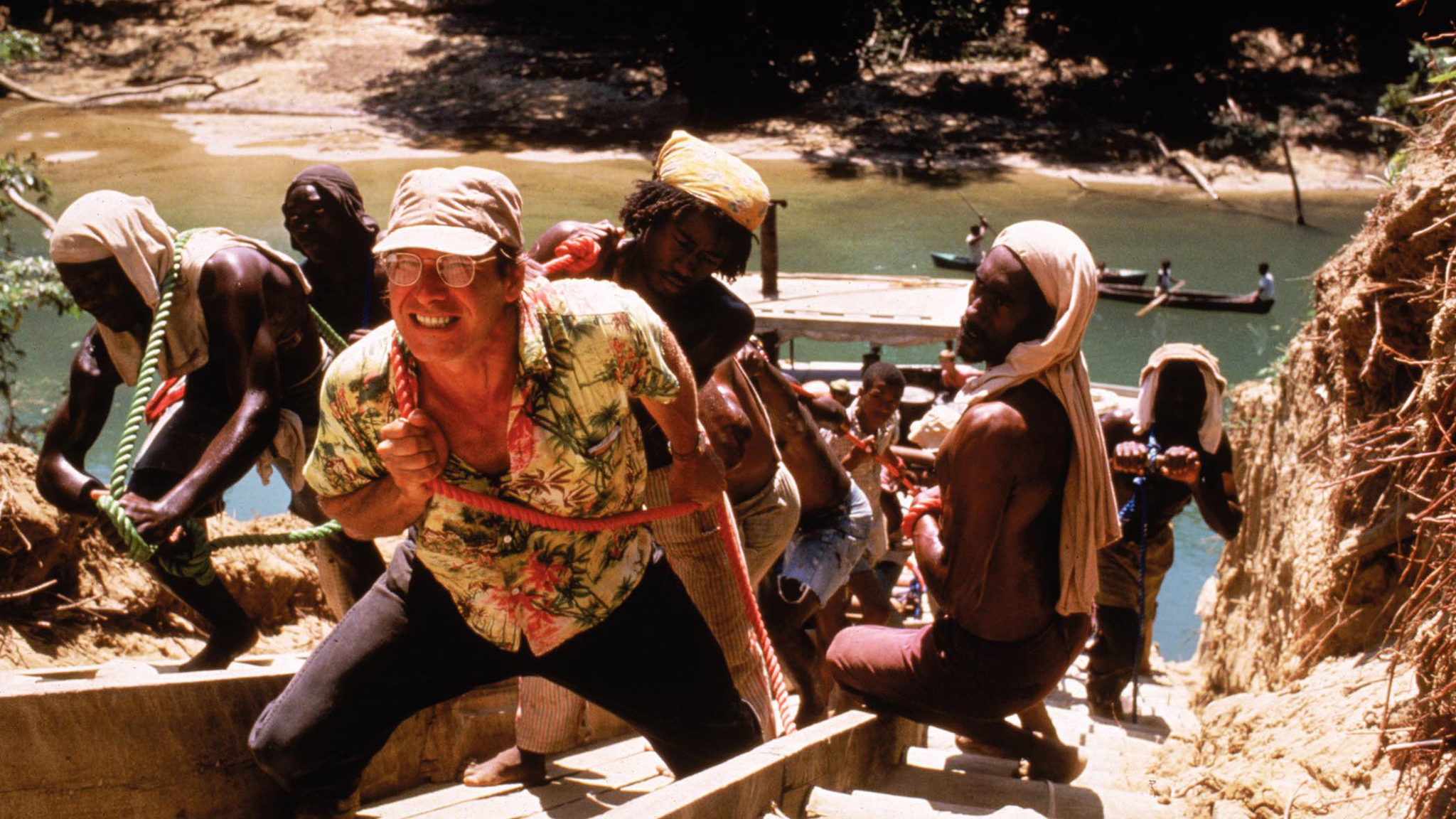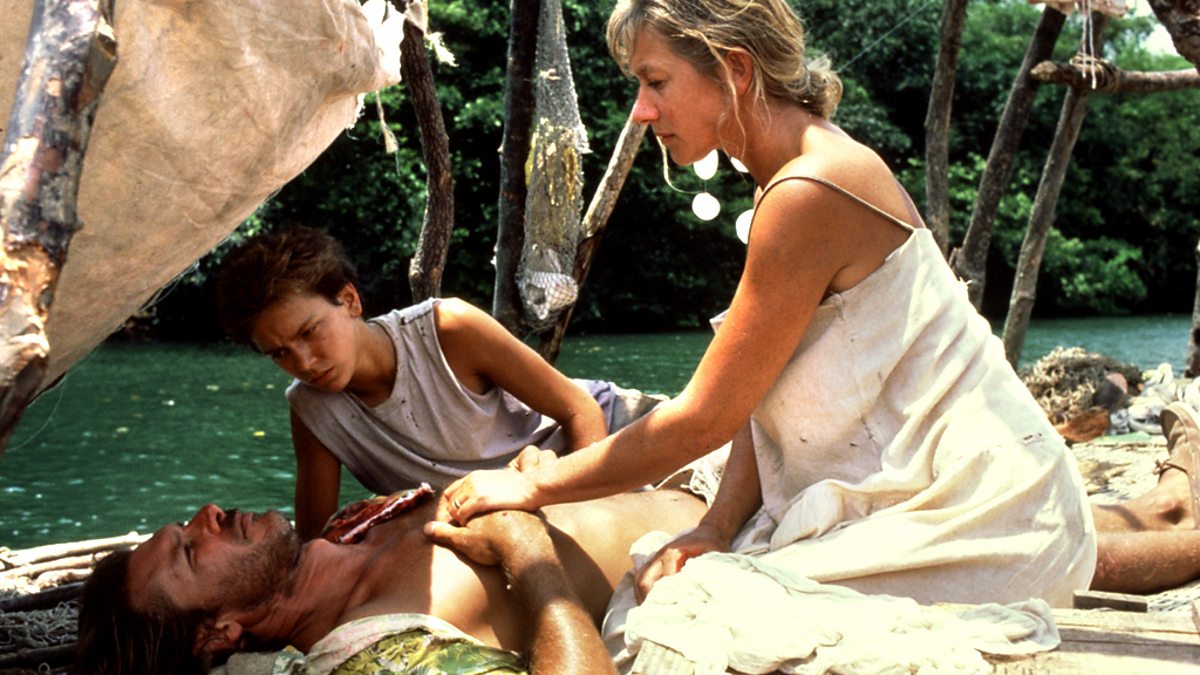

“I grew up with the belief that the world belonged to him, and that everything he said was true.”
Ambitious but uneven, The Mosquito Coast details an egotistical pragmatist’s descent into self-delusion on an epic scale. Fed up with the American way of life, eccentric inventor Allie Fox (Harrison Ford) packs up his young family and heads for the Caribbean, purchasing the deed to a ramshackle village where he plans to build a small-scale civilization in his own image. Touching lightly on themes of science vs. religion, modern man’s loss of fundamental knowledge, and the perils of hubris, Peter Weir’s adaptation of Paul Theroux’s novel has several notable high points, but a sparse script and tonal inconsistencies gradually dampen the momentum generated in first act. It was a box office bomb upon release, owing to Ford’s against type casting and its pronged critique of both the average American over-consumer and the hardcore counterculturalist alike. Certainly better than its lukewarm reception but still well short of its intended mark, The Mosquito Coast is decidedly mid-tier Weir—but that’s still pretty good.
Allie Fox is a rugged individualist carving out a niche for himself as a tinkerer in the employ of a wealthy farmer. He’s disgusted by the gross consumption of American culture, disillusioned with the notion of the American Dream, and distrusting of the powers that be. He believes that America has lost whatever made it special, if it ever was special to begin with. Many of his talking points are standard anticonsumerist viewpoints—too much television, too much soda, too much government spending, too many handouts, too much reliance on foreign-made products, too many low wage immigrant workers—but rather than ignore, tolerate, or reform what he sees as a diseased society, Allie jumps ship. With his ego bruised by Farmer Polski’s (Dick O’Neill) rejection of his latest invention, he has an epiphany when showing his boys the squalid living quarters of the farm’s migrant workers. If tasteless Americans will not appreciate his genius, he’ll find an audience who will. And so, with the grand ambition of introducing the miracle of ice to the natives of Belize and playing out a white savior fantasy, Allie throws on a Hawaiian shirt, grabs his wife and four kids, and hops on a Panamanian barge headed for the Central America.
We eat when we’re not hungry, drink when we’re not thirsty. We buy what we don’t need and throw away everything that’s useful. Why sell a man what he wants? Sell him what he doesn’t need. Pretend he’s got eight legs and two stomachs and money to burn. It’s wrong. Wrong, wrong, wrong.

Watching Allie emulate Robinson Crusoe and raise a little town is not without its pleasures. Like the crew manually hauling a steamship over a mountain in Herzog’s Fitzcarraldo, there’s a certain tactility that comes through as Allie and his family hack through the dense jungle brush, mill lumber with chainsaws, set up irrigation systems, create a much larger version of his ice machine (dubbed Fat Boy), and settle into their new life in the jungle surrounded by their adoring native neighbors. Weirs develops an idyllic aura that is gradually torn apart as Allie’s plan goes awry.
Regrettably, Allie’s descent into madness is telegraphed too early. As a result, his devolution from proud know-it-all into tyrannical ruler over his small slice of jungle—and after it is reduced to ashes, merely his family—is not the interesting character study it could have been. His intermittent conflict with Reverend Spellgood (Andre Gregory), whom he pridefully argues with on the boat by quoting Scripture at him, is likewise shallow and predictable—the only surprise in their relationship occurs when the missionary unloads a rifle round in the direction of the Fox family. The other minor source of conflict is a trio of outlaws who arrive at the unprotected compound with firearms and move right in. From Allie’s first glimpse of the outlaws when he visits a secluded tribe who’ve supposedly never seen ice or white men before, to his ridiculous claim that the compound is infested with ants, this entire arc is filled with comedy that doesn’t jibe with the rest of the story. This is especially true when Allie enlists his son Charlie (River Phoenix) to help him murder the intruders.
I’ve scarcely mentioned Allie’s family, and that’s because the characters barely exist. Despite River Phoenix’s cloying narration, the story is not told from his perspective, and he serves as little more than a sounding board for his father’s diatribes. The same goes for the younger brother Jerry (Jadrien Steele). The twins (Hilary and Rebecca Gordon) barely have any lines at all. The two boys are surprisingly effective at evoking emotion through their gazes alone, but it would have been nice to have some more substance for those two as the admiration toward their father turns to hate. Helen Mirren’s compliant Mother (yeah, Allie calls his wife Mother) is a poor sketch of a character, an intelligent and capable woman who inexplicably enables her husband’s outrageous jags while overlooking his manipulations and abuse of both herself and their children. Mirren is quite good in the role, though, and cannot be blamed for Paul Schrader’s uneven script. Conrad Roberts plays a dependable native named Mr. Haddy, while Martha Plimpton plays Reverend Spellgood’s daughter and potential romantic interest for Charlie. Jason Alexander (George Costanza from Seinfeld) and Butterfly McQueen (Prissy in Gone with the Wind) feature in small, blink-and-you-miss-it roles.

With a bit more poise, The Mosquito Coast could have been very thought-provoking in its exploration of the individualist mindset. Allie Fox is an interesting character, a walking conundrum trying to make sense of a world that is at odds with his outlook. He’s an obsessive, a tacit racist, a reckless buccaneer; but he is also a fearless leader, admirably toiling in the sweaty jungle along with his subordinates and treating his camp to the finer things when they achieve success. His solutions may have flaws of their own, but his criticisms of American culture are not inherently wrong and his initial drastic choice is at least respectable. Where The Mosquito Coast stumbles is in its uncertain portrayal of the character. It’s challenging to assess because it so often flip-flops on whether it wants to portray Allie as a misunderstood hero, a serial optimist whose genius intellect and work ethic overcome his rage and disdain for others; or as an abusive egotist who lords over the native “savages” and alienates everyone he loves. If the goal was to hold these views in tension, I do not think that was achieved.
Slow and methodical, The Mosquito Coast toes the line of being truly good, but ultimately fizzles out because it shows its hand too early and doesn’t have enough clever wrinkles to otherwise sustain itself. The ambition of the project is laudable, especially the antihero performance from Ford and the physical authenticity of the sets; but I’d be lying if I said the latter portions of the film didn’t underwhelm compared with the excitement conjured up in the earlygoing.